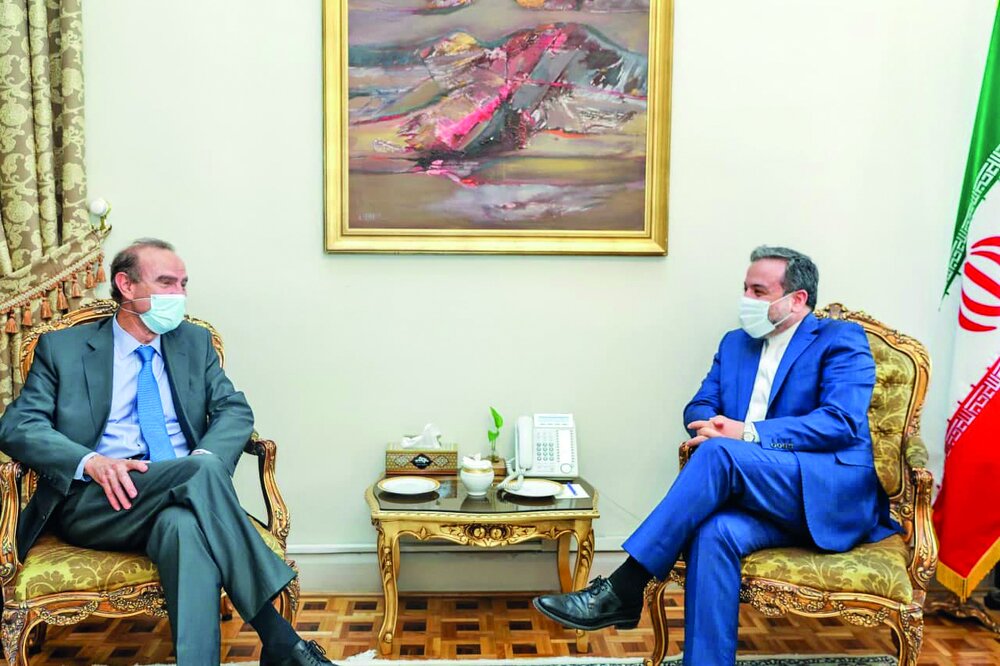EU’s Enrique Mora holds talks with Araqchi in Tehran

TEHRAN - European External Action Service (EEAS) Deputy Secretary General Enrique Mora, who has visited Tehran to attend the inauguration of Ebrahim Raisi as the new Iranian president, held talks on Wednesday with Iranian Deputy Foreign Minister Abbas Araqchi, who led the Iranian team in six rounds of nuclear talks in Vienna.
Mora has been leading the nuclear talks in Vienna between Iran, the European Union, Britain, France, Germany, Russia, China and the United States with the aim of reviving the 2015 nuclear deal, officially called the JCPOA.
The talks have been held within the Joint Commission of the JCPOA.
Negotiators from the U.S. has been participating in the talks indirectly because Iran has said it will not talk directly with the U.S. until Washington decides to return the JCPOA and lift sanctions.
According to the media office of the Iranian Foreign Ministry, Mora and Araqchi exchanged views about the most important regional and international issues, especially developments in Afghanistan.
Relations and mutual cooperation between Iran and the EU in different areas also featured in the talks, the Foreign Ministry said.
The ministry said the last issues surrounding the JCPOA and continuation of talks were also discussed between the two sides.
Stephan Klement, the EU ambassador in Vienna who also acts as EEAS special advisor on Iran nuclear issue, and Bruno Scholl, head of the EU Task Force Iran, are accompanying Mora to Iran.
On Tuesday, before Mora arrived in Tehran, EEAS spokeswoman Nabila Massrali said, “It is crucial to engage diplomatically with the new administration (in Iran) and to pass directly important messages.”
Massrali also said Mora “will attend the inauguration on behalf of [EU top diplomat Josep Borrell].”
As coordinator of the deal, Borrell’s “key priority is to resume negotiations … and to facilitate the way back to full JCPOA implementation,” Massrali said, according to Politico.
Mora is the EU official overseeing the negotiations on a day-to-day basis.
The talks to revive the JCPOA started in April. The last round of talks ended on June 20. No date is still being set for a resumption of the talks because of power transition in Iran.
In a tweet on July 17, Araqchi said, “We're in a transition period as a democratic transfer of power is underway in our capital. #Vienna_talks must thus obviously await our new administration. This is what every democracy demands.”
On Tuesday, President Raisi said he “will certainly seek to lift the sanctions” on Iran.
“We will certainly seek to lift the oppressive sanctions, but we will certainly not condition the people’s livelihood, and we will not tie it to the will of foreigners. I thank all the government officials of the twelfth government, but there is still a lot of work that needs to be done by the incoming administration. We have identified an immediate and short-term transformation plan to address the issues ahead. We will deal with them quickly,” Raisi said in his endorsement ceremony in the presence of the Leader of the Islamic Revolution and several other high-ranking officials.
In an interview with the Financial Times published on Tuesday, Iranian Ambassador to London Mohsen Baharvand said that the nuclear talks had made “very good progress”.
But he added three key requests by Iran: for a guarantee that the U.S. could not unilaterally abandon the deal in the future; for sanctions to be lifted; and for the talks to not be linked to Iran’s missile program or its regional policies.
Former U.S. President Donald Trump unilaterally quit the JCPOA and imposed the harshest sanctions in history on Iran within his “maximum pressure” campaign against Iran. This was done in violation of UN Security Council Resolution 2231 that endorsed the nuclear pact.
